Introduction
Good nutrition during pregnancy is very important for your baby to grow and develop. During pregnancy it is important that you eat a healthy and balanced diet so you can provide the developing baby with everything it needs. A woman's body absorbs more nutrients from food than usual while pregnant, so eating a variety of foods will ensure you and your baby get the right balance of vitamins and nutrients. During pregnancy you are required to consume quality food rather than quantity. Quantity may be increased as the pregnancy progresses especially in the third trimester. Making smart food choices are one of the huge responsibilities during pregnancy, but fortunately, it's fairly simple.
Weight Gain during Pregnancy
During pregnancy, your body undergoes many changes and weight gain is one of them. Try to remember that most of the weight you carry will be your baby, amniotic fluid, the placenta, your breasts expanding and fat laid down to help prepare for breastfeeding. Weight gain is one of the most positive signs of a healthy pregnancy. When you eat well and gain the appropriate amount of weight, it helps you protect you and your baby's health.
How much weight you need to gain depends on your pre-pregnancy weight. The recommended weight gain a woman who begins pregnancy at a healthy weight and is carrying a single fetus is 25-35 pounds (11 - 16 kg). An underweight woman needs to gain between 28-40 pounds (13-18 kg), and an overweight woman, between 15 -25 pounds (7-11 kg).
Weight-Gain Pattern
Normal weight women
For the normal weight woman, you should gain the least weight during the first trimester; about 1.5kg (3.5 pounds) and then gain about 0.5 kg (1 pound) per week in the second and third trimester, achieving a total gain of 11 -16 kg (25-35 pounds) .
Underweight women
For an underweight weight woman, you should gain about 2kg (5 pounds) and then gain about 0.5 kg (1 pound) per week in the second and third trimester, achieving a total gain of 13-18 kg (28-40 pounds).
Overweight women
For an overweight weight woman, you should gain about 1kg (2 pounds) and then gain about 0.3 kg (2/3 pound) per week in the second and third trimester, achieving a total gain of 7-11 kg (15-25 pounds).
If you gain more weight than it's recommended early in pregnancy, you should not restrict your energy intake in order to lose weight.
Regardless of your pre-pregnancy weight make sure you keep track of your pregnancy weight gain.
Recommendations to keep you and your baby healthy
Enjoy a Variety of Foods
Good nutrition means eating a variety of foods. No single food contains all the nutrients that our bodies need, except for breast milk for babies up to the age of six months. Eating a variety of different foods will supply the nutrients that are essential for your bodies. By making your food choices from foods that are in season and locally available, eating can be enjoyable, healthy and affordable.
Starches
Grains will not only supply your body with energy, they are also rich sources of fiber, iron, B vitamins, various minerals and a small amount of protein. Fortified bread and cereal can help you get enough folic acid. Make more of your food choices from whole-grain cereals, brown rice, whole-wheat and whole grain bread and less of refined products such as white bread and rice. Look for products that list whole grains, such as whole-wheat flour, in their ingredients list.
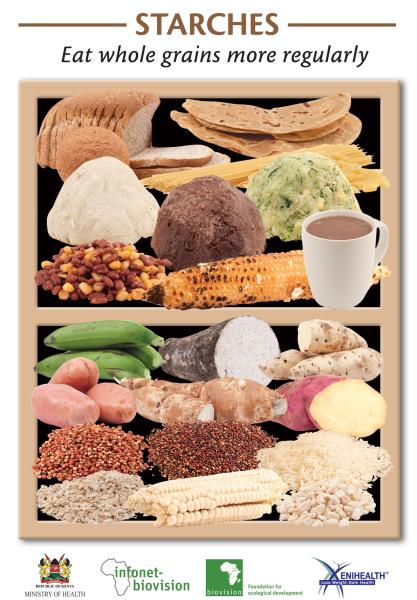 |
| Starches |
|
© Biovision
|
Fruits and vegetables
Fruits and vegetables provide various vitamins and minerals and healthful fibre critical during pregnancy nutrition. For instance, Vitamin C found in many fruits and vegetables, helps you absorb iron and promotes healthy gums for both you and your baby. Dark green vegetables have vitamin A, iron and folate important nutrients during pregnancy.
Common vegetables in Kenya are sukuma wiki, cabbages, spinach, pumpkin leaves, green peas, and indigenous vegetables.
Common fruits in Kenya are oranges, mangoes, pineapples, apples, water melon, avocadoes, passion fruits, paw paws ripe bananas.
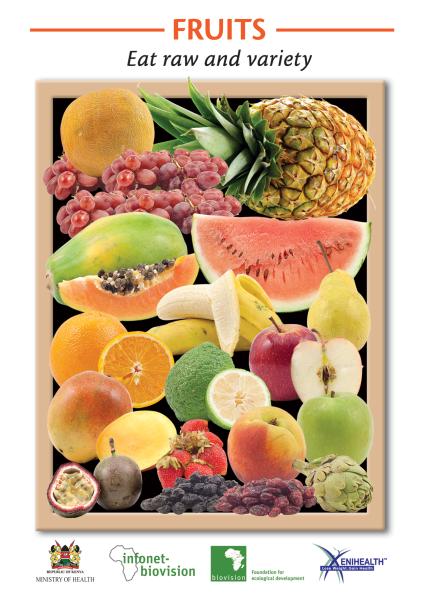 |
| Fruits |
|
© Biovision
|
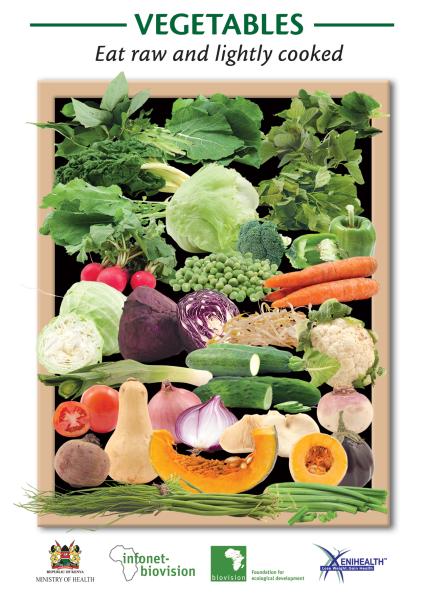 |
| Vegetables |
|
© Biovision
|
Protein
Protein is crucial for your baby's growth, especially during the second and third trimesters. Fish is an excellent source of protein as well as omega-3 fatty acids, which promotes your baby's brain development.
Plant-based foods include; legumes (peas, green beans), cereals, beans, pulses, grains, nuts, seeds, soya products.
Protein from animal sources contains all the essential amino acids. Animal sources include; meat, poultry, fish, omena, milk, eggs, and cheese.
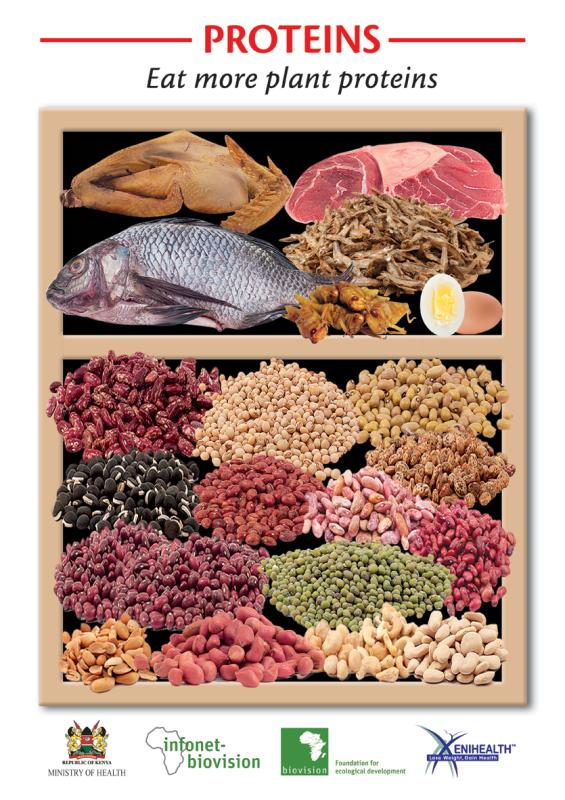 |
| Proteins |
|
© Biovision
|
Dairy products
The calcium in dairy products and calcium-fortified soy milk helps build your baby's bones and teeth. Dairy products also have vitamin D and protein.
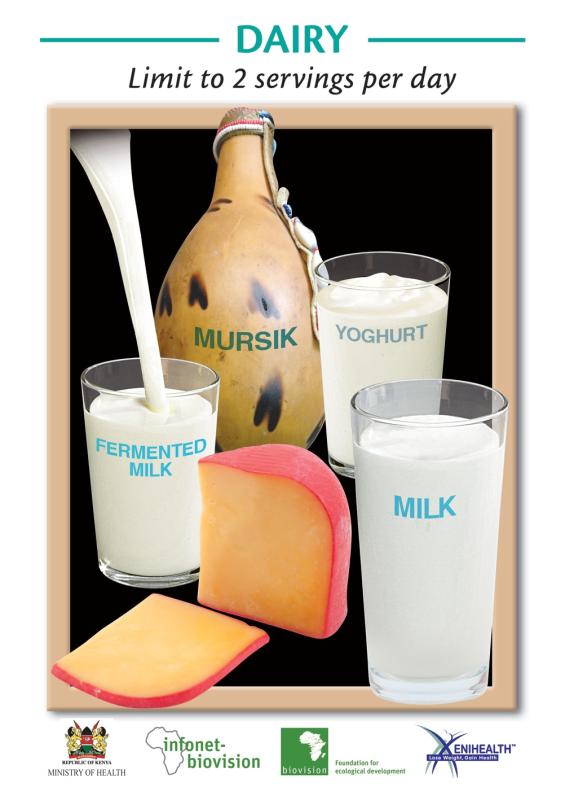 |
| Diary Pyramid |
| © Biovision |
Water
Water carries nutrients from the food you eat to your baby. It can also help prevent constipation, hemorrhoids, and excessive swelling, and urinary tract or bladder infections. As your pregnancy progresses, drinking too little water can contribute to premature or early labor.
 |
| Water |
|
© Su Kahumbu, Kenya
|
Fats and oils
Fat is the body's major source of energy storage. The kind of fat and amount are important. It is recommended that you use unsaturated fats and control your portion sizes and choose foods that are low in fat.
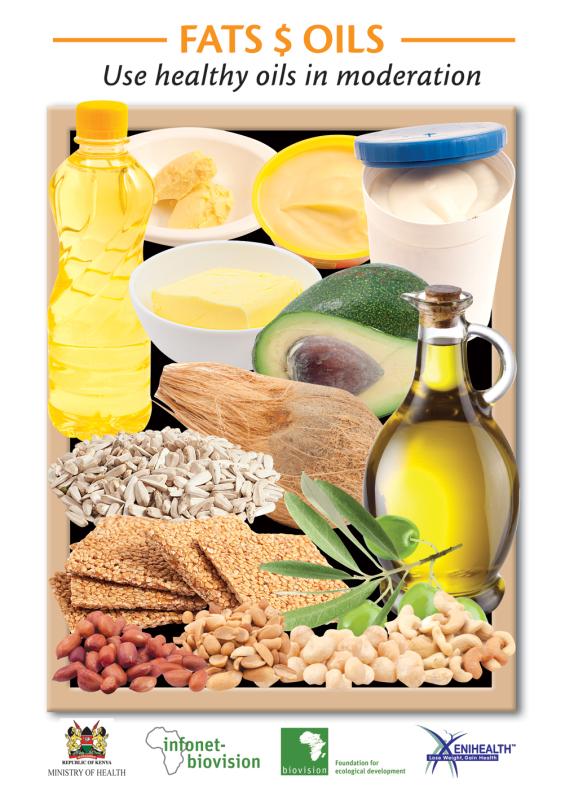 |
| Fats and Oils |
|
© Biovision
|
Nutrition Supplements
Vitamins and mineral supplements may be recommended to ensure a healthy pregnancy outcome; however they should only be prescribed by your doctor. Always consult your health care provider before taking any new vitamins or supplements during pregnancy.
Easing common nutrition related concerns of pregnancy
Nausea or morning sickness, constipation, heartburn and food sensitivities are common nutrition-related concerns during pregnancy.
Nausea/ Morning Sickness
Some pregnant women have nausea and vomiting in the early months of pregnancy, early in the morning when they get up or last all day.
To ease the nausea of pregnancy:
- Eat dry oats/crackers, cereal,
- Eat small, frequent meals throughout the day;
- Avoid foods with offensive odours
- When nauseated, drink carbonated beverages instead of citrus juice, water, milk, coffee or tea
Constipation
A very common complaint during pregnancy; changes in hormones and the growing baby increase the pressure on the intestinal organs contribute to constipation experiences. To prevent or ease constipation:
- Make simple changes in your diet; consume foods high in fiber (whole grain cereals, vegetables, and fruits)
- Drink at least eight glasses of liquids a day
- Exercise regularly
- Never take a laxative or other remedy unless your doctor tells you to.
Heartburn, Gas
Early in your pregnancy you may experience bloating after eating or burping frequently. You may also experience a burning sensation in your chest. This is not always caused by your diet. The increased pressure on your stomach from the growing baby and the changes in your hormones contribute to these discomfort.
To prevent or ease heartburn:
- Relax and eat slowly
- Chew your food thoroughly
- Eat small, frequent meals
- Drink liquids between meals
- Avoid spicy, fatty, and fried foods that are hard to digest or cause gas and heartburn
- Wait an hour after eating before lying down
- Wait two hours after eating before exercising
Practices Incompatible with Pregnancy
A variety of lifestyle practices can have adverse effects to your pregnancy.
Avoid alcohol
All pregnant women should avoid drinking alcohol. Alcohol consumption can cause premature delivery, low birth weight babies, irreversible mental and physical retardation of the baby.
Avoid excess caffeine
Caffeine is a stimulant found in drinks like coffee, tea and energy drinks and foods like chocolate. Some studies suggest that too much intake of caffeine during pregnancy increases the risk of miscarriage. Considering the potential effects on your developing baby, it is recommended to limit the amount of caffeine in your diet throughout pregnancy to a cup of coffee or two 12-ounce cola beverages a day.
Avoid weight-Loss Dieting
Weight loss dieting even for short periods is hazardous during pregnancy. You and your baby need a steady supply of calories and nutrients through out nine months of pregnancy and beyond. Weight gain is one of the most positive signs of a healthy pregnancy. On the other hand, weight loss diets are likely to lack important nutrients for baby growth and development. Regardless of pre-pregnancy weight, pregnant women should never intentionally lose weight.
Avoid Self prescription of Medicinal drugs
Self prescription of medication during pregnancy is prohibited. They can cause complications during pregnancy, problems in labor, and serious birth defects. For these reasons, you should not take any medicines without consulting your doctor/physician during pregnancy.
Avoid illicit drugs
Pregnant women should refrain from illicit drugs. Drugs such as cocaine, easily cross the placenta and impair fetal growth and development. They are also responsible for preterm births, low-birth weight infants, prenatal deaths and sudden infant deaths.
Avoid Smoking and Chewing Tobacco
Smoking cigarettes and chewing tobacco at any time exert harmful effects, and pregnancy dramatically magnifies the hazards of these practices. Smoking restricts the blood supply to the growing fetus and thus limits oxygen and nutrient delivery and waste removal. Smoking also contributes to low birth weight, interferes with lung growth and increases the risks of respiratory infections and childhood asthma.
Review Process
Author: Alice Ojwang Ndong
Information Source Links
Rolfes S R, Pinna K, Whitney E. Understanding normal and clinical nutrition 8th Edition. Yolanda Cossio; 2009. ISBN-13: 978-0-495-55646-6
